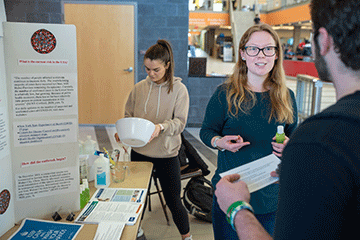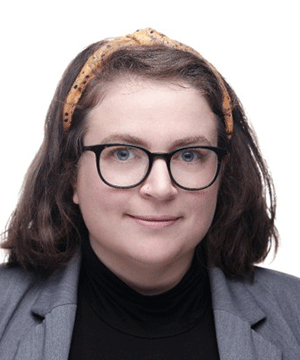
04/02/2024
Health concerns and voting rights are two issues commonly on the political agenda in the U.S. However, there’s an interesting link between public health policy and political equity in this country that many may not be paying attention to.
According to Gnora Mahs, who has a Master in Public Health, that relationship plays a significant role in how democracy manifests throughout the U.S.
“Health is a political choice,” said Mahs, partnerships director for Healthy Democracy Healthy People, a nonpartisan initiative of major public health and civic engagement organizations focusing on realizing health and racial equity. It does so by advancing an inclusive, healthy democracy that promotes civic and voter participation.
“The policies that impact health access and the social determinants of health are decided through democratic practices.”

Mahs, a doctoral candidate in public health at George Washington University and lifelong community organizer, will discuss the public health context, history and evidence that underscores the importance of having an inclusive, representative democracy to advance health and racial equity, on Wednesday, April 3, at SUNY Cortland.
She will present the 16th Charles N. Poskanzer lecture, titled “Health Democracy is Necessary for Health Communities: Public Health Must Act,” at 11:30 a.m. in Sperry Center, Room 106.
From a young age, Mahs marched on picket lines, knocked on doors for pro-labor candidates, and registered voters with her family. This early appreciation of community organizing led her to seek out opportunities to build community power and influence.
She would go on to strengthen grassroots movements for reproductive health equity and voting rights with Planned Parenthood Advocates of Oregon.
Mahs credits her work in both fields as a natural progression to focusing on the connection between health and political equity.
“I started to see a broader picture about inequities in power and representation as key upstream determinants of health, which inspired me to further my studies and bring my community organizing background to research efforts aimed at addressing structural determinants,” Mahs said.
In her first year at George Washington University’s Milken Institute School of Public Health, studying for her Master’s in Public Health, her passions for health and politics were indelibly united in one educational moment.
While talking about health disparities that impacted Indigenous communities, she noticed a North Dakota policy that enacts strict voter identification rules, making it harder for Indigenous communities to vote.
“It felt like a lightbulb went off in my head,” she said. “How can we expect policies to be informed by communities experiencing health inequities if our democratic systems intentionally make it harder for their voices to be heard?”
Mahs continued her social activism. Before her current role, she worked at the Alliance for Youth Action as a director of network capacity, where she supported youth-centered organizations that promoted democracy reform and economic justice across the country.
Her message:
“Democracy must be inclusive and representative to assure these political conditions for health and racial equity. Public health must, therefore, see this work as central to achieving health and racial equity.”
The annual lecture is supported by the Charles N. Poskanzer Fund, an endowment named in honor of the late SUNY Distinguished Service Professor emeritus who taught in the university’s Health Department for 40 years.
The Poskanzer fund was established through the Cortland College Foundation as an endowment to support an annual public lecture offered by the university’s Health Department in honor of its retired colleague. The presentation brings national leaders in public and community health to campus to meet with students and faculty and to deliver a public lecture on a current public health issue.
Prepared by communications office writing intern Jean-Andre Sassine Jr. '23
Top image: The SUNY Cortland Health Department's chapter of the national honor society Eta Sigma Gamma held an information session on how to make your own hand sanitizer in the Student Life Center.